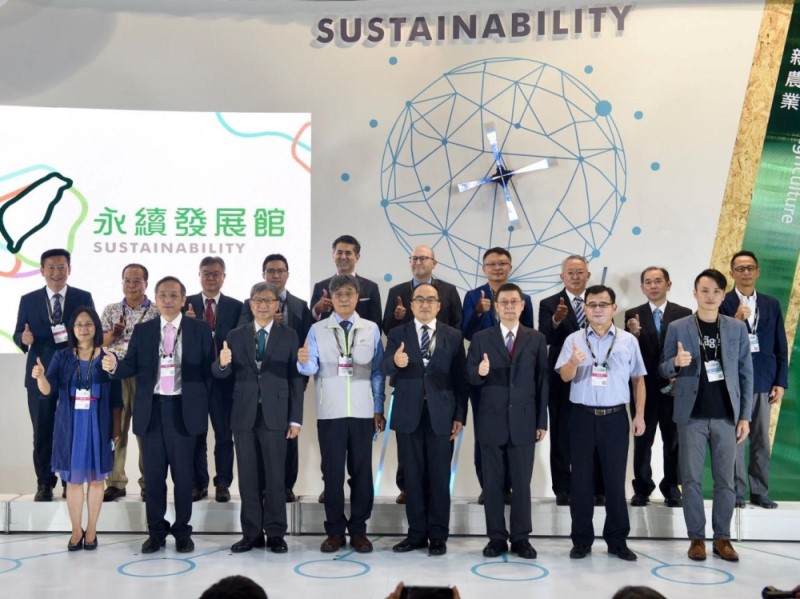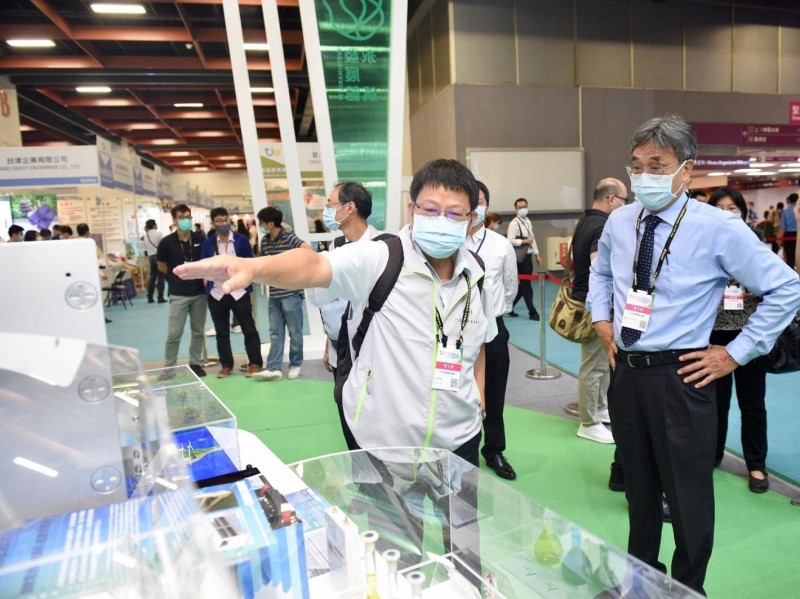News
The “Sustainability Pavilion” at the “2020 Taiwan Innotech Expo” Links Circular Sustainability of Life, Energy, and Resources
The “2020 Taiwan Innotech Expo” is being held in Exhibition Hall 1 of the Taipei World Trade Center from September 24 to 26. The Expo is a joint exhibition featuring three pavilions: “Innovation Pilot,” “Future Tech,” and “Sustainability.” The Council of Agriculture (COA) is once again in charge of overall planning for the Sustainability Pavilion, which will be run by seven government agencies (the COA, the Environmental Protection Administration, the Industrial Development Bureau and the Bureau of Energy of the Ministry of Economic Affairs, the State-owned Enterprise Commission, the Atomic Energy Council, and the Ministry of Labor). The Pavilion has four main themes (“New Agriculture,” “Green Energy Technology,” “The Circular Economy,” and “Workplace Safety”) and is displaying 120 items of innovative technology. In addition, the Pavilion includes a special area for highlighted technology, exhibiting key technologies from the seven agencies through the concepts of “resource sustainability,” “energy sustainability,” and “life sustainability.” Furthermore, for the Pavilion’s international area a total of 10 international organizations from Japan, Germany, France, Denmark, the Netherlands, Singapore, and Malaysia have been invited to collectively display technologies related to agriculture, green energy, the circular economy, and smart technology, as well as high-tech analytical instruments and products. Everyone is welcome to attend!
The COA exhibits 30 innovative technologies, demonstrating the strong capabilities of agricultural R&D
The COA states that its displays in the Sustainability Pavilion, under the main theme of “New Agriculture,” were laid out in three special technology areas: “new agricultural models,” “agricultural safety systems,” and “agricultural marketing capabilities.” In these areas 30 technology R&D achievements with potential for commercialization were exhibited. These included “technologies for use of the whole fish” developed by the Fisheries Research Institute, which are ten processing technologies for fish that still has the skin on it, as well as for fish bones, viscera, and scales. Excluding the gills, the yield rate and usage rate for fish are both at virtually 100%, greatly reducing waste. Another item displayed was the “Taitung No.3” (“Green Treasure”) new variety of sugar apple, which took the Taitung District Agricultural Research and Extension Station (DARES) ten years to selectively breed. It is characterized by the large size and high sugar concentration of the fruit. When grown using production season adjustment technology it can be harvested twice per year. It also has a low rate of abscission and post-harvest dehiscence. Overall this new variety of sugar apple has great export potential. Also exhibited was the MLBv19-3 rapid rice straw decomposing bacteria, which was screened out of more than 200 strains over five years by the Miaoli DARES. It can rapidly and completely decompose raw rice straw within seven days. Developed as a liquid hydrolysate, it only needs to be dripped into the water inlet of wet fields and it completely spreads in 5-10 minutes per tenth of a hectare of land. It saves labor and is convenient, and farmers no longer have to burn their rice straw, reducing air pollution and avoiding fines. Moreover, one year after its use, fertilizer efficiency increases by 3-5%, reducing fertilizer costs and wages for workers to spread fertilizer by about NT$4,000 per hectare. Aside from these, many other technologies related to circular and sustainable agriculture are being shown at the Expo venue, and it is hoped that through business matchmaking and licensing at this Expo these can be made widely available for use by farmers and businesses.

Famous international agribusinesses come to Taiwan to create a “1+1>2” effect
The Taiwan Innotech Expo has already become an important platform for transnational technology marketing. For this reason, in order to construct an effective transaction platform for innovative R&D, the organizers of the Sustainability Pavilion specially invited large-scale international agribusinesses from France, Denmark, the Netherlands, Singapore, and elsewhere to collectively exhibit advanced technologies in fields that include agricultural germplasm, smart livestock management, and testing of farming and livestock products, and which were displayed in the Pavilion’s international area. These included the melon[gourd vegetable] germplasm that is resistant to cucurbit chlorotic yellows virus and heat-resistant bell peppers developed by the World Vegetable Center. The brightly colored melons[gourd vegetables] at the Expo were very eye-catching, and in the future these will be promoted in the international market. In addition, the Pavilion brought together Lely Industries (a company from the Netherlands that is a world leader in dairy farm automation equipment), Provimi (a Singapore enterprise that is a global authority on animal nutrition), and SEPPIC (a French firm that is the world’s largest supplier of animal vaccines) to exhibit smart livestock management equipment and animal nutrition and vaccine products at the Expo. Furthermore, the Danish company FOSS, which has 21 branch organizations around the world, is displaying a variety of high-tech analytical instruments for agricultural, livestock, and food products. Meanwhile, the French firm IMV, which sells products in 140 countries and which has a leading position in the world in the areas of artificial insemination, semen freezing, and embryo transfer, will mainly exhibit advanced instruments for examining poultry and livestock embryos.
In order to get the multiplier effect in which 1+1>2, Lely Industries of the Netherlands is cooperating with COA’s Livestock Research Institute, the Dairy Association Taiwan R.O.C., and the Dairy Farmer Association R.O.C. Taiwan to hold the “Milking Robots for Dairy Farms Seminar” on the first day of the Expo on the second floor of the exhibition hall. The two sides are exchanging practical experiences with the software and hardware of milking robots on dairy farms as well as information about supporting technologies, significantly upgrading the international competitiveness of Taiwan’s dairy industry. On the second day of the Expo, at the same location, France’s IMV company and Taiwan’s Formosa Fortune Group are jointly holding the conference on “New Applied Technology in Animal Reproduction and Conservation,” bringing together Formosa Fortune Group’s Taiwanese breeding pig genes and frozen semen production capabilities with IMV’s cutting edge artificial insemination devices and testing instruments to jointly expand into international markets.

Today (September 24) in conference room 5 on the second floor of the exhibition hall the “Forum on Industrial Application of High-value Agricultural Ingredients” is being held. COA Deputy Minister Chen Junne-jih will open the forum. Besides continuing to focus on promoting the “Program for Constructing High-value Agricultural Ingredients Development and Industrial Linkage Services” (to run from 2020 to 2023), it is hoped that Taiwan can accelerate the linking up of agricultural ingredients industrial chains, as well as enhance the value-added agricultural ingredients industrial chains composed of upstream producers, midstream manufacturers, and downstream sales channels. The aim of the Forum is to share development strategies, market information, and R&D results with future potential for agricultural ingredients.
Taiwan Agriculture TechnoMart simultaneously introduces technologies displayed at the Expo, using the Internet to do global marketing
To strengthen online marketing and sharing of information related to agricultural technologies exhibited at the Expo, the COA has used the Taiwan Agriculture TechnoMart website (TATM, https://tatm.coa.gov.tw/) to distribute an e-newsletter with information about negotiations to become a technology transfer partner company, and also used the website to introduce various technologies in detail and show explanatory videos, which were provided for viewing by businesses with potential need for technology. The COA also put out an open invitation to businesses that require technology to engage in one-on-one business matchmaking during the Expo period, and also permitted the making of online reservations through the TATM website for negotiating technology deals and discussing cooperation opportunities during the Expo, in order to promote the industrialization of Taiwan’s agricultural technology R&D achievements.
